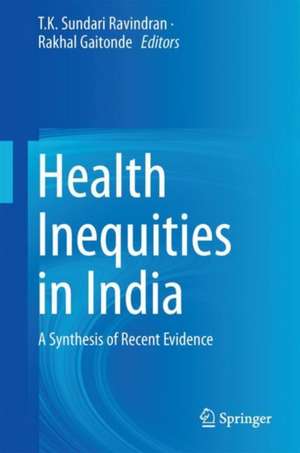Health Inequities in India: A Synthesis of Recent Evidence
Editat de T.K. Sundari Ravindran, Rakhal Gaitondeen Limba Engleză Hardback – 22 ian 2018
This volume highlights and addresses research gaps in both methodology and content, and is valuable to researchers and students of public health and allied health disciplines, including the social sciences, and also to policy makers and donors.
| Toate formatele și edițiile | Preț | Express |
|---|---|---|
| Paperback (1) | 715.35 lei 3-5 săpt. | |
| Springer Nature Singapore – 30 ian 2019 | 715.35 lei 3-5 săpt. | |
| Hardback (1) | 678.03 lei 38-44 zile | |
| Springer Nature Singapore – 22 ian 2018 | 678.03 lei 38-44 zile |
Preț: 678.03 lei
Preț vechi: 713.72 lei
-5% Nou
Puncte Express: 1017
Preț estimativ în valută:
129.76€ • 140.90$ • 108.100£
129.76€ • 140.90$ • 108.100£
Carte tipărită la comandă
Livrare economică 18-24 aprilie
Preluare comenzi: 021 569.72.76
Specificații
ISBN-13: 9789811050886
ISBN-10: 9811050880
Pagini: 261
Ilustrații: XXV, 239 p. 11 illus., 7 illus. in color.
Dimensiuni: 155 x 235 mm
Greutate: 0.59 kg
Ediția:1st ed. 2018
Editura: Springer Nature Singapore
Colecția Springer
Locul publicării:Singapore, Singapore
ISBN-10: 9811050880
Pagini: 261
Ilustrații: XXV, 239 p. 11 illus., 7 illus. in color.
Dimensiuni: 155 x 235 mm
Greutate: 0.59 kg
Ediția:1st ed. 2018
Editura: Springer Nature Singapore
Colecția Springer
Locul publicării:Singapore, Singapore
Cuprins
Chapter 1. Structural Drivers of Inequities in Health TK Sundari Ravindran, Rakhal Gaitonde & Prashanth Nuggehalli Srinivas.- Chapter 2. Conceptual Approaches to Examining Health Inequities Rakhal Gaitonde.- Chapter 3. Research on Inequities and Inequalities in Health in India: A Mapping of the Field Rakhal Gaitonde.- Chapter 4. Health inequities in India by Socio-economic Position Prashanth Nuggehalli Srinivas.- Chapter 5. Inequities in Health in India and Dalit and Adivasi Populations Sudharshini Subramaniam.- Chapter 6. Gender-based Inequities in Health in India Priyadarshini Chidambaram.- Chapter 7. Other Socially-Constructed Vulnerabilities: Focus on People Living with HIV/AIDS and Internal Migrants Grace A. Chitra.- Chapter 8. The Role of the Health System Rakhal Gaitonde.- Chapter 9. Health Equity Research: A Political Project TK Sundari Ravindran, RakhalGaitonde, Pras
hanth Nuggehalli Srinivas, Sudharshini Subramaniam, Priyadarshini Chidambaram and Grace A. Chitra.
hanth Nuggehalli Srinivas, Sudharshini Subramaniam, Priyadarshini Chidambaram and Grace A. Chitra.
Notă biografică
TK Sundari Ravindran is Professor, Achutha Menon Centre for Health Science Studies, Sree Chitra Tirunal Institute for Medical Sciences and Technology, Thiruvananthapuram, Kerala, India.
Rakhal Gaitonde is a PhD scholar at the Department of Public Health and Clinical Medicine, Umea University, Umea, Sweden.
Textul de pe ultima copertă
This timely contribution to the global literature on health inequities approaches the subject through a synthesis and analysis of relevant published literature on India. Amongst the BRICS countries, India ranks the lowest in the gender-gap index and has the highest poverty rate, and there is clear evidence that socio-economic inequalities have increased in India in the twenty-first century. These have direct impact on the health conditions of its people; however, there has been relatively little concerted research attention on health inequities in India. This volume fills the gap by synthesizing research evidence since the year 2000 on the topic. This is perhaps the first volume on this topic of such scope and breadth. Its uniqueness lies in the synthesis of evidence across a range of axes of disadvantages within a single volume: socio-economic position, caste, gender, other socially constructed vulnerabilities such as disability, HIV status, migrant status; and health-system factors contributing to or mitigating inequities in health. Each core chapter not only summarizes research findings but also engages critically with the perspectives reflected in the chapters and proposes a framework for understanding the mechanisms through which health inequities result.
This volume highlights and addresses research gaps in both methodology and content, and is valuable to researchers and students of public health and allied health disciplines, including the social sciences, and also to policy makers and donors.
This volume highlights and addresses research gaps in both methodology and content, and is valuable to researchers and students of public health and allied health disciplines, including the social sciences, and also to policy makers and donors.
Caracteristici
Brings together a vast expanse of research on health inequities in India in a single volume Identifies research gaps and proposes areas for future research on health inequities Discusses all the major documented axes of marginalisation in one volume Includes supplementary material: sn.pub/extras
